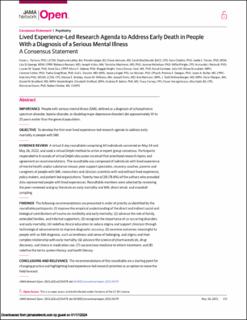Lived Experience-Led Research Agenda to Address Early Death in People With a Diagnosis of a Serious Mental Illness: A Consensus Statement
Fortuna, Karen L.; Lebby, Stephanie; Geiger, Pamela; Johnson, Diane; MacDonald, Sandi; Chefetz, Ilana; Ferron, Joelle C.; St George, Lisa; Rossom, Rebecca; Kalisa, Joseph; Mestrovic, Tomislav; Nicholson, Joanne; Pringle, Willie; Rotondi, Armando J.; Sippel, Lauren M.; Sica, Amie; Solesio, Maria E.; Wright, Maggie; Zisman-Ilani, Yaara; Gambee, David; Hill, Julia; Brundrett, Alison; Cather, Corinne; Rhee, Taeho Greg; Daumit, Gail L.; Angel, Jessica; Manion, Ian; Deegan, Patricia E.; Butler, Jason A.; Pitts, Nakristia; Brodey, Denise E.; Williams, Aaron M.; Parks, Joseph; Reimann, Brie; Wahrenberger, J Todd; Morgan, Oscar; Bradford, Daniel W.; Bright, Nicole; Stafford, Elizabeth; Bohm, Andrew R.; Carney, Tracy; Haragirimana, Claver; Gold, Alisa; Storm, Marianne; Walker, Robert
Peer reviewed, Journal article
Published version
Permanent lenke
https://hdl.handle.net/11250/3118637Utgivelsesdato
2023Metadata
Vis full innførselSamlinger
Originalversjon
Fortuna, K. L., Lebby, S., Geiger, P., Johnson, D., MacDonald, S., Chefetz, I., ... & Walker, R. (2023). Lived Experience–Led Research Agenda to Address Early Death in People With a Diagnosis of a Serious Mental Illness: A Consensus Statement. JAMA network open, 6(5), e2315479. 10.1001/jamanetworkopen.2023.15479Sammendrag
Importance People with serious mental illness (SMI), defined as a diagnosis of schizophrenia spectrum disorder, bipolar disorder, or disabling major depressive disorder) die approximately 10 to 25 years earlier than the general population.
Objective To develop the first-ever lived experience–led research agenda to address early mortality in people with SMI.
Evidence Review A virtual 2-day roundtable comprising 40 individuals convened on May 24 and May 26, 2022, and used a virtual Delphi method to arrive at expert group consensus. Participants responded to 6 rounds of virtual Delphi discussion via email that prioritized research topics and agreement on recommendations. The roundtable was composed of individuals with lived experience of mental health and/or substance misuse, peer support specialists, recovery coaches, parents and caregivers of people with SMI, researchers and clinician-scientists with and without lived experience, policy makers, and patient-led organizations. Twenty-two of 28 (78.6%) of the authors who provided data represented people with lived experiences. Roundtable members were selected by reviewing the peer-reviewed and gray literature on early mortality and SMI, direct email, and snowball sampling.
Findings The following recommendations are presented in order of priority as identified by the roundtable participants: (1) improve the empirical understanding of the direct and indirect social and biological contributions of trauma on morbidity and early mortality; (2) advance the role of family, extended families, and informal supporters; (3) recognize the importance of co-occurring disorders and early mortality; (4) redefine clinical education to reduce stigma and support clinicians through technological advancements to improve diagnostic accuracy; (5) examine outcomes meaningful to people with an SMI diagnosis, such as loneliness and sense of belonging, and stigma and their complex relationship with early mortality; (6) advance the science of pharmaceuticals, drug discovery, and choice in medication use; (7) use precision medicine to inform treatment; and (8) redefine the terms system literacy and health literacy.
Conclusions and Relevance The recommendations of this roundtable are a starting point for changing practice and highlighting lived experience–led research priorities as an option to move the field forward.

